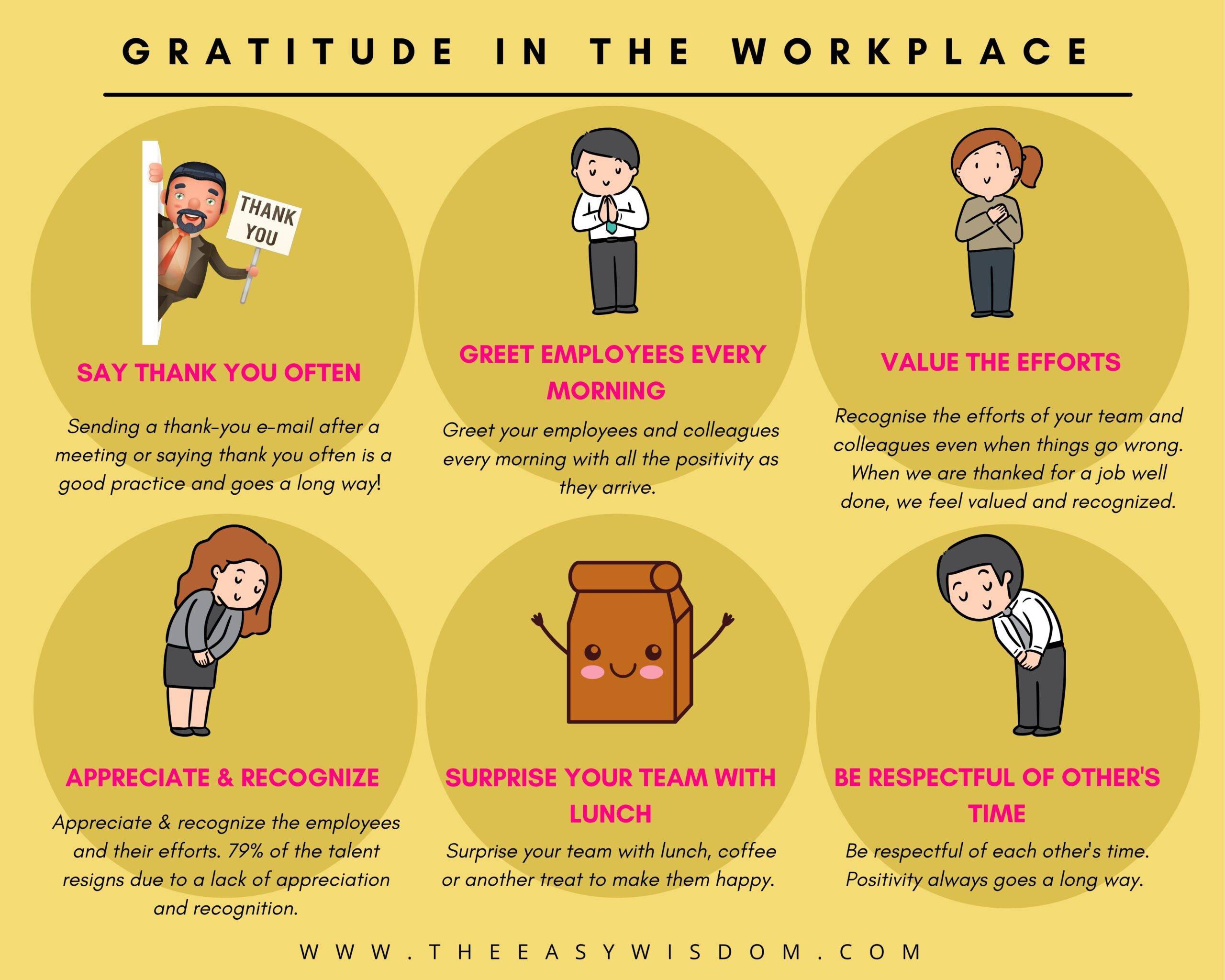In This Article
In today’s fast-paced world, where we constantly juggle multiple responsibilities, it’s easy to forget to take a step back and appreciate what we have. This is especially true in the office, where we typically focus on our to-do lists and deadlines instead of taking the time to express gratitude towards our colleagues and employers. But did you know that showing gratitude at work can significantly impact your overall job satisfaction, workplace culture, and productivity? Yes, there are many benefits to expressing gratitude in the workplace.
Gratitude is a powerful emotion that has been linked to increased levels of happiness, improved relationships at work, reduced stress, and a happier workforce. By making gratitude a part of our daily routine at work, we can foster a more positive and supportive work environment. It, in turn, can lead to greater success and fulfillment in our professional lives. Gratitude also helps to improve the company culture, create better leaders, and improve workplace dynamics. It indeed creates a win-win situation for all.
We, therefore, should take a moment to pause, say thank you to those around us, and learn how to practice gratitude in the workplace. So whether you’re a manager looking to boost team morale or an employee seeking to enhance your work experience, you should believe in the power of gratitude.
How to practice and express gratitude in the workplace?
Expressing gratitude in the workplace can be a powerful way to build positive relationships with colleagues and foster a culture of appreciation. Here are some ways to express gratitude in the workplace:
1. Say thank you more often
A simple “thank you” can go a long way in showing appreciation. Be specific about why you’re thanking the person, whether it’s their help on a project or their positive attitude in the workplace.
2. Write a thank you note
A handwritten note or email expressing your gratitude can make a significant impact. Be sincere and specific in your message, and try to personalize it to the recipient.
3. Greet employees every morning
Greet your co-workers every morning as you see them. These small gestures go a long way.
4. Value the efforts
Recognize the efforts of your team and co-workers, even when things go wrong. People feel valued when they are given due credit for their work, regardless of the outcome. Appreciation and employee recognition are both important in the workplace. As a matter of fact, 79% of the talent resigns due to a lack of appreciation and recognition.
5. Give public recognition
If someone has done something exceptional, consider recognizing them publicly in a team meeting or on a company-wide communication channel. This can help boost morale and motivate others to do their best.
6. Offer a small gift
A small token of appreciation, such as a gift card or a thoughtful item related to the recipient’s interests, can show that you value their contributions and care about them as a person.
7. Surprise your team with lunch
Surprise your team with lunch, coffee, or another treat to make them happy.
8. Be respectful of each other’s time
It is always advisable to be respectful of each other’s time. Respect always goes a long way.
9. Help out when needed
Sometimes the best way to show gratitude is to offer assistance when someone needs it. This can be anything from doing extra work to lending an ear when someone needs to vent.
Remember that expressing gratitude should be genuine and sincere. When you take the time to show appreciation for others in the workplace, you can help build a positive and supportive work environment that benefits everyone.
Benefits of gratitude in the workplace
1. Gratitude increases employee productivity
Gratitude appreciates people, not talents. It is easy to recognize a person for his contributions at work. But gratitude teaches us to appreciate a person for other non-work related activities as well. It includes welcoming an employee for making others laugh or showing appreciation for after-hours volunteering commitment. One way to express gratitude at the workplace for hard work is by giving the employee a flexible work schedule or recognizing his additional work in front of the entire team. Small gestures go a long way toward enhancing employee productivity.
2. Gratitude creates better leaders
Work-life is stressful, and it doubles to more stress for the leaders. Expressing gratitude reduces stress and leads to more happiness. It helps create positive emotions that translate to more commitment and engagement, leading to employee success. When leaders express gratitude in the workplace, they create a platform for cohesion and synergy. Mindful business leaders are wise enough to recognize this attitude of gratitude and create a healthy and robust work environment.
3. Gratitude helps forge strong relationships
Not only does gratitude help the person who receives it, but it also helps the person who shows it. It positively impacts both parties. It, therefore, strengthens your relationships with others, including your work dynamics.
4. Gratitude positively impacts the company culture
Millennials want more than just a job. They want conducive and positive work culture where they can enjoy their time and develop meaningful relationships at work. As you encourage and build a culture of expressing gratitude in your organization, it becomes a happier and more productive workplace. It leads to talent retention and employee engagement and attracts the best talents from the job pool. The employer brand becomes strong, and the employee value proposition becomes more attractive.
Today’s employees require more than a transactional alliance. They want to feel that their work is important and meaningful and that their contributions are appreciated. The culture of gratitude in the workplace can help companies make their employee value proposition more appealing.
Conscious business leaders are wise and generous with using both tangible and non-tangible rewards. They find more room for expressing gratitude in the workplace and their personal lives.
To sum up, gratitude is a powerful emotion that can have a number of positive benefits in the workplace. Here are some of the benefits of gratitude in the workplace:
- Increases job satisfaction: When employees feel appreciated and valued, they are more likely to feel satisfied with their jobs. Expressing gratitude towards employees can help create a positive work environment where employees feel acknowledged and recognized for their hard work.
- Improved retention rates: When employees feel valued and appreciated, they are more likely to stay with their company long-term.
- Improves relationships: Gratitude can help improve workplace relationships by fostering a sense of trust and respect between colleagues. When employees feel appreciated and valued, they are more likely to develop positive relationships with their co-workers, which can lead to better teamwork and collaboration.
- Reduces stress: Workplace stress is a common problem that can have negative effects on employee health and productivity. Expressing gratitude towards employees can help reduce workplace stress by creating a positive work environment where employees feel supported and valued.
- Boosts morale and motivation: Gratitude can help boost employee morale and motivation by creating a sense of positivity and optimism in the workplace. When employees feel appreciated and valued, they are more likely to feel invested in their work and committed to the success of the organization.
- Enhances productivity: Gratitude can help enhance employee productivity by creating a positive work environment that fosters creativity and innovation. When employees feel appreciated and valued, they are more likely to feel motivated to perform their best and contribute to the organization’s success.
Overall, being grateful at work can have many positive effects, such as making people happier at work, improving relationships, lowering stress, boosting morale and motivation, and making people more productive. Encouraging a culture of gratitude in the workplace can be a powerful way to build a positive, supportive, and productive work environment.
Gratitude goes beyond praise. And one thing is clear, expressing gratitude can be very rewarding. So let us learn how to be grateful and use simple thank you for changing the workplace and how employees interact, engage, and perform.
PS: If you’re looking for motivation in your life, check out The Easy Wisdom YouTube Studio.













